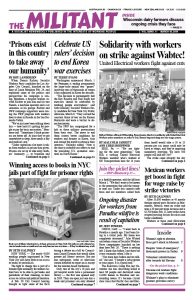March 21, 1994
The decision to devalue the African franc brought millions of working people closer to the knife’s edge of survival. The governments of the African Financial Community ostensibly made the choice. But in reality the deed was done at the urging of the former colonial master — Paris — which dominates much of the economic and political life in the 14 countries in the franc zone.
Working people throughout Africa confront calamitous social and economic conditions — from famines brought on by imperialist oppression, to the deaths of half a million people annually from tuberculosis.
The debt is a vehicle for the transfer of wealth created by the labor of workers and peasants into the coffers of the bosses in North America, Europe, and Japan. Working people have an obligation to demand that this burden be lifted and that the debt be completely cancelled.
March 21, 1969
Current revelations about why the Johnson administration switched on Vietnam provide a powerful confirmation of the tremendous effect of the organized antiwar movement and the massive demonstrations it has staged. The antiwar movement was a major factor in compelling Johnson to decide to negotiate with Hanoi, give up the presidency and halt the bombing of North Vietnam.
Gen. Westmoreland had requested 206,000 reinforcements in March to make up for ground lost to the Vietnamese during the Tet offensive.
But “it would tear the country apart, Defense Secretary [Clark Clifford] argued,” the New York Times revealed. Continuing the escalation policy, he warned, could bring “civil war.”
Johnson’s March 31 speech, instead of a promise of more troops, was an abdication and an announcement of the intention to begin negotiations.
March 18, 1944
Britain’s ruling class stands panic-stricken as over 100,000 striking coal miners enter the second week of their militant struggle, the greatest demonstration of British working class power since the 1926 General Strike. The majority of the South Wales miners, who represent the heart of the strike movement, at rank and file pit head meetings rejected the demands of their treacherous leaders that they resume work.
These leaders over the week-end sought to drum up a back-to-work vote with frantic patriotic appeals and glib promises that all the miners’ demands will be granted after they return to work. But the labor bureaucrats have, for the time being, lost all control of the situation. The rank and file members are fighting mad.
The miners are fighting out of fear for their future under continued capitalist control of the mines.

